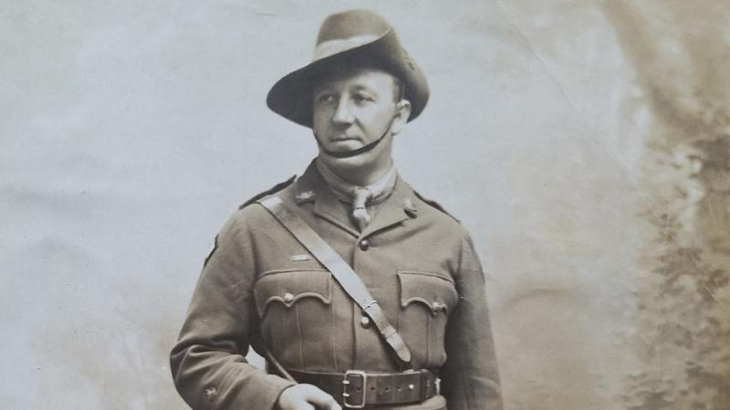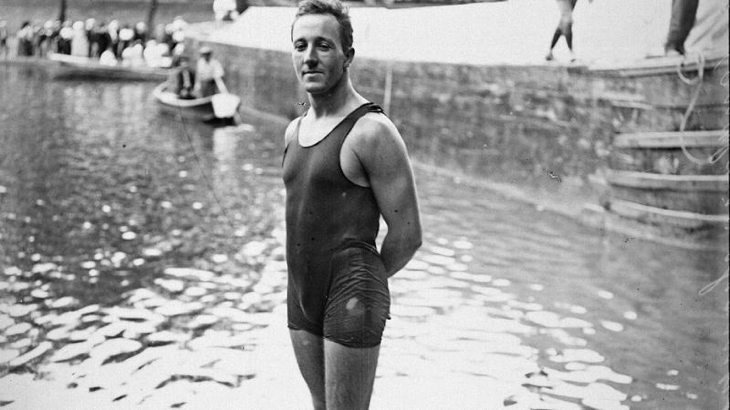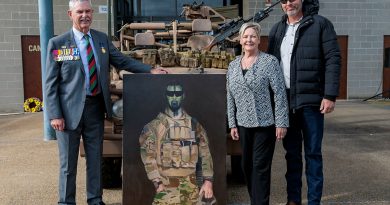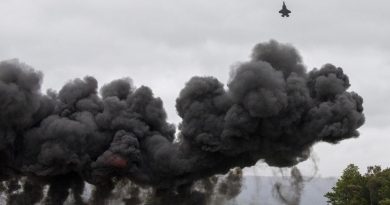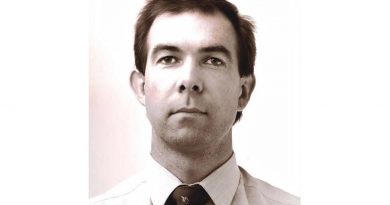Remembering Aussie Olympic Gold medalist killed in action
Share the post "Remembering Aussie Olympic Gold medalist killed in action"

Olympians Kaarle McCulloch and Michelle Ford have honoured the memory of Cecil Healy, the only Australian Olympic gold medallist to die in combat.
CAPTION: Second Lieutenant Cecil Healy is the only Australian Olympian to have died in combat.
The pair laid wreaths and flowers on Healy’s grave at a war cemetery in the small French village of Assevillers, an hour north of Paris.
Healy, the who won gold and silver in swimming at the Stockholm 1912 Games, was gunned down at the Somme in France on August 29, 1918 – just 73 days before World War 1 ended.
The Olympians were joined by Assistant Minister to the Prime Minister Patrick Gorman, Australia’s Ambassador to France, Gillian Bird, and the Mayor of Assevillers, Didier Jacob.
Second Lieutenant Cecil Healy was a member of the 19th (Sportsman’s) Battalion. He and other Australian soldiers had come to liberate the villages of the Somme area when he was killed by machine-gun fire.
His death was keenly felt in the Australian Olympic movement, not only because of his exceptional qualities as a freestyle swimmer, but particularly for the extraordinary act of sportsmanship he displayed at the Stockholm Games.
Healy denied himself a certain gold medal by insisting the race favourite, Duke Kahanamoku, be allowed to compete in the 100 metres freestyle final despite the American champion missing his semi-final because of an apparent mix-up.
Healy’s stance led to officials holding a special semi-final, which included the American, who went on to win the final, with Healy picking up the silver.
Healy felt that without Kahanamoku in the race, any gold medal would be tarnished.
In 2018, the Australian Olympic Committee announced the Cecil Healy Award for Outstanding Sportsmanship to acknowledge his contribution – awarded for the first time to Cedric Dubler after the Tokyo 2020 Games.
CAPTION: Olympic swimming gold and silver medallist Cecil Healy in Paris.
Australian Olympic Team Deputy Chef de Mission and dual Olympic track cyclist Kaarle McCulloch said Healy was an inspirational Australian.
“This was a very proud moment for me today. Cecil Healy’s memory is a powerful presence in the village of Assevillers – they have embraced his memory and his achievements,” she said.
“What stands out is his leadership, his bravery and his sportsmanship. And, of course, he was such a wonderful athlete. Accounts of his life paint a vivid picture of a great Australian who lived his Olympic values. What a tragedy that he lost his life at a young age with the First World War coming to an end.
“He and Duke Kahanamoku were obviously great friends, with the Duke’s visit to Australia in 1914 putting surfing on the map in Australia. And now surfing is an Olympic sport – something that Cecil and Duke Kahanamoku could not have imagined back then. Today was an exceptional experience.”
Dual Olympian and Moscow 1980 gold medallist Michelle Ford joined the commemoration, honouring Healy’s courage.
“It took a lot to go beyond our shores to Europe during a troubled time for the world to compete at the Stockholm 1912 Games – paying his own way, also. I wanted to be part of this today to join the AOC and recognise someone who really stood for all the Olympic values,” she said.
Following the wreath-laying, a further commemoration was held at a statue of the sportsman/soldier, which was unveiled in 2018, marking 100 years since his death.
Assevillers resident Bertrand Fareneau had researched Healy’s background in 2016, leading to the commissioning of the statue.
Mayor Jacob, community members from Assevillers and the Australian party later shared a friendship toast to honour the strong bonds that link France and Australia.
Ms McCulloch presented the Mayor with a book on Healy’s life, Cecil Healy – A Biography, by late gold medallist and champion swimmer John Devitt and author Larry Writer.
.
.

.
.
Share the post "Remembering Aussie Olympic Gold medalist killed in action"

